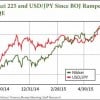Sorry, no content matched your criteria.
Featured Story
How the QE Delusion Is Inflating the Japanese Stock Market

The Japanese stock market is up big and the yen is getting crushed as the Bank of Japan lays on the stimulus.
This is all unfolding as the BOJ planned when it first announced an acceleration of its quantitative easing measures in October 2014.
The Japanese stock market is up big and the yen is getting crushed as the Bank of Japan lays on the stimulus.
This is all unfolding as the BOJ planned when it first announced an acceleration of its quantitative easing measures in October 2014.
